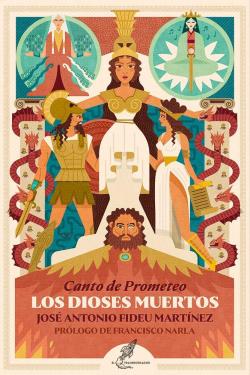 |
ENGLISH REVIEW Recently, I had the pleasure of immersing myself in the wonderful edition of “The Dead Gods: Prometheus' Song” published by Ediciones El Transbordador, a masterpiece written by José Antonio Fideu, an author known for his ability to combine elements of science fiction and fantasy in his stories. The book begins with the touching reunion between Prometheus and Cleon, two characters facing the weight of time, the loss of loved ones, and the desire for revenge. United by a common goal, they plan an epic vengeance aimed at tearing down the foundations of Olympus. Before embarking on the final battle, Prometheus asks Cleon for one last favor: to remember the story he is about to tell and prevent it from being forgotten so that others may have a better future. Through Cleon, we discover the life of Prometheus, filled with battles that earned him the favor of the gods and the admiration of his compatriots. Prometheus became a practically invincible warrior, not only because of his great strength but also because of his cunning in devising strategies to defeat even the most fearsome enemies. The plot of this incredible story, which moves between science fiction and fantasy, unfolds on a devastated Earth for unknown reasons. Greece has transformed into an Eden that, unlike the wild tribes, shines with its own light thanks to deities such as Zeus, Athena, Dionysus, or Hades. However, Greece will not be the only setting for the novel. Alongside Prometheus, we will travel through sulfur seas, other planets, and even to the heart of the Earth, as humans have established new colonies in countless places after being denied entry to paradise. Prometheus' unwavering faith in the gods wavers when he marries Pandora, a professor at the Academy. She not only teaches him the meaning of love in its fullness but also to question imposed truths, something both will pay dearly for. José Antonio Fideu, the author of “The Dead Gods: Prometheus' Song,” also wrote “The Last Days of Magic,” one of my favorite novels. Although I am not a regular reader of science fiction, I decided to read his new work, and once again, his prose captivated me. In its pages, we will find ancient gods, nanobots, space creatures, familiar monsters, and others difficult to imagine, as well as a great love story, epic battles, and a biting critique of a society blinded by the poisoned gifts of supposed protective deities. The future that Fideu proposes is as plausible as it is terrifying. Fortunately, there will always be heroes like Prometheus willing to change the world, even if the price to pay is terrible. Listen carefully to Prometheus' Song, for his voice will guide you through this epic story written by a master of letters, showing you that both those who triumph and those who succumb can be heroes, but never those who abandon the fight. SPANISH REVIEW Recientemente, tuve el placer de sumergirme en la maravillosa edición de “Los dioses muertos. Canto de Prometeo” publicada por Ediciones El Transbordador, una obra maestra escrita por José Antonio Fideu, un autor reconocido por su capacidad de combinar elementos de ciencia ficción y fantasía en sus historias. El libro comienza con el conmovedor reencuentro entre Prometeo y Cleón, dos personajes que se enfrentan al peso del tiempo, la pérdida de seres queridos y el deseo de venganza. Unidos por un objetivo común, planean una épica venganza que tiene como meta derribar los cimientos del Olimpo. Antes de embarcarse en la última batalla, Prometeo le pide un último favor a Cleón: que recuerde la historia que está a punto de contarle y evite que caiga en el olvido, para que otros puedan tener un futuro mejor. A través de Cleón, descubrimos la vida de Prometeo, repleta de batallas que le ganaron el favor de los dioses y la admiración de sus compatriotas. Prometeo se convirtió en un guerrero prácticamente invencible, no solo por su gran fuerza sino también por su astucia al elaborar estrategias para derrotar incluso a los enemigos más temibles. La trama de esta increíble historia, que se mueve entre la ciencia ficción y la fantasía, se desarrolla en un planeta Tierra devastado por causas desconocidas. Grecia se ha transformado en un edén que, a diferencia de las tribus salvajes, brilla con luz propia gracias a deidades como Zeus, Atenea, Dioniso o Hades. Sin embargo, Grecia no será el único escenario de la novela. Junto a Prometeo, viajaremos por mares de sulfuro, otros planetas e incluso al corazón de la Tierra, ya que los humanos han establecido nuevas colonias en innumerables lugares tras serles negada la entrada al paraíso. La fe inquebrantable de Prometeo en los dioses se tambalea cuando se casa con Pandora, una profesora en la Academia. Ella no solo le enseña el significado del amor en su plenitud, sino también a cuestionar las verdades impuestas, algo que ambos acabarán pagando muy caro. José Antonio Fideu, el autor de “Los dioses muertos. Canto de Prometeo”, también escribió “Los últimos días de la magia”, una de mis novelas favoritas. Aunque no soy una lectora habitual de ciencia ficción, decidí leer su nueva obra y, una vez más, su prosa me cautivó. En sus páginas encontraremos antiguos dioses, nanobots, criaturas espaciales, monstruos conocidos y otros difíciles de imaginar, así como una gran historia de amor, épicas batallas y una crítica mordaz a una sociedad cegada por los dones envenenados de supuestas deidades protectoras. El futuro que plantea Fideu es tan plausible como aterrador. Afortunadamente, siempre existirán héroes como Prometeo dispuestos a cambiar el mundo, aunque el precio a pagar sea terrible. Escuchen atentamente el Canto de Prometeo, pues su voz los guiará a lo largo de esta épica historia escrita por un maestro de las letras, mostrándoles que tanto el que triunfa como el que sucumbe pueden ser héroes, pero nunca aquel que abandona la lucha. Enlace: https://laestanteria.blog/bl.. |

>







